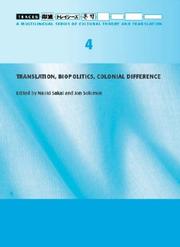| Listing 1 - 9 of 9 |
Sort by
|

ISBN: 0816628637 0816628629 Year: 1999 Publisher: Minneapolis, Minn. University of Minnesota Press
Abstract | Keywords | Export | Availability | Bookmark
 Loading...
Loading...Choose an application
- Reference Manager
- EndNote
- RefWorks (Direct export to RefWorks)
J4122 --- Japan: Sociology and anthropology -- nationalism --- Japan --- Intellectual life. --- Psycholinguistics --- Translation science --- Theory of literary translation
Book
ISBN: 9781501737756 Year: 2019 Publisher: Ithaca, NY
Abstract | Keywords | Export | Availability | Bookmark
 Loading...
Loading...Choose an application
- Reference Manager
- EndNote
- RefWorks (Direct export to RefWorks)

ISBN: 9622097731 9789622097735 962209774X 9789622097742 Year: 2006 Publisher: Hong Kong Hong Kong University Press
Abstract | Keywords | Export | Availability | Bookmark
 Loading...
Loading...Choose an application
- Reference Manager
- EndNote
- RefWorks (Direct export to RefWorks)
The international group of authors deal, both theoretically and empirically, with the historical obstacles and future opportunities offered by an emerging global order that is still struggling with the legacy of the previous four centuries of Eurocentric capitalist development. The authors amply illustrate that the concept of translation is far from being singularly determined, and how extremely difficult it is for philosophy to be distinct from translation. Here translation is regarded as a general concept, by which the Eurocentric framework implicit in the existent academic practices of comparison is problematized and according to which old questions are transformed into new ones and articulated to one another across disciplinary boundaries and regional or national borders.This book shows how the emerging global order might be viewed once we have been liberated from the Eurocentric perspective; it includes sociological inquiries into the system of international security networks and an analysis of the consequences of the transformation of the nation-state; it deals with the foundation of international law and its unalienable connection to modern colonial violence, and the foundational complicity between modern sovereignty and biopolitics. On an empirical note, the essays in this major volume deal with the various practices of translation in multiple locales, the belated constitution of anthropological language, philosophical discussion on translation, and the sexual aspects of translational politics.The relations between economics, ontology, and politics together form the crossroads at which the authors in this volume meet. As such, the volume will be of interest to an interdisciplinary audience of readers in the Humanities concerned with the intersections among politics, economy, philosophy, postcoloniality, and translation studies, and would above all attract interest from the emerging readership in biopolitics (under the field of comparative literature).
Sociolinguistics --- Translation science --- Translating and interpreting --- Globalization --- Political culture. --- Philosophy. --- Social aspects.
Book
ISBN: 4753102858 9784753102853 Year: 2010 Publisher: Tōkyō : Ibunsha,
Abstract | Keywords | Export | Availability | Bookmark
 Loading...
Loading...Choose an application
- Reference Manager
- EndNote
- RefWorks (Direct export to RefWorks)
Nihon shisō-Rekishi. --- Nihon-Rekishi-Kindai. --- Philosophy --- Philosophy, Japanese --- Political science --- Philosophy --- History

ISBN: 1885445873 Year: 1997 Publisher: Ithaca Cornell university. East Asia program
Abstract | Keywords | Export | Availability | Bookmark
 Loading...
Loading...Choose an application
- Reference Manager
- EndNote
- RefWorks (Direct export to RefWorks)
Book
ISBN: 9780415562164 0415562163 9780203849880 0203849884 Year: 2010 Publisher: Milton Park, Abingdon, Oxon ; New York, NY : Routledge,
Abstract | Keywords | Export | Availability | Bookmark
 Loading...
Loading...Choose an application
- Reference Manager
- EndNote
- RefWorks (Direct export to RefWorks)
Politique et culture --- Politique et gouvernement --- Politics and culture --- Sakai, Naoki, --- Criticism and interpretation. --- Japan --- Politics and government.
Book

ISBN: 178309186X 1783091851 9781783091850 Year: 2014 Publisher: Bristol Blue Ridge Summit
Abstract | Keywords | Export | Availability | Bookmark
 Loading...
Loading...Choose an application
- Reference Manager
- EndNote
- RefWorks (Direct export to RefWorks)
How does language or culture come to be standardized to the degree that it is considered 'homogeneous'? How does teaching language relate to such standardization processes? How can teaching be mindful of the standardization processes that potentially involve power relations? Focusing on the case of Japanese, which is often viewed as homogenous in terms of language and culture, this volume explores these questions in a wide range of contexts: the notions of translation and modernity, the ideologies of the standardization of regional dialects in Japan, current practices in college Japanese-as-a- Foreign-Language classrooms in the United States, discourses in journals of Japanese language education, and classroom practices in nursery and primary schools in Japan. This volume’s investigation of standardization processes of Japanese language and culture addresses the intersections of theoretical and practical concerns of researchers and educators that are often overlooked.
Language and culture --- Japanese language --- Education --- Study and teaching. --- Culture


ISBN: 9780231509886 Year: 2005 Publisher: New York, NY
Abstract | Keywords | Export | Availability | Bookmark
 Loading...
Loading...Choose an application
- Reference Manager
- EndNote
- RefWorks (Direct export to RefWorks)
Book

ISBN: 9781978803374 1978803370 9781978803381 1978803389 9781978803336 1978803338 Year: 2019 Publisher: New Brunswick, NJ
Abstract | Keywords | Export | Availability | Bookmark
 Loading...
Loading...Choose an application
- Reference Manager
- EndNote
- RefWorks (Direct export to RefWorks)
| Listing 1 - 9 of 9 |
Sort by
|

 Search
Search Feedback
Feedback About UniCat
About UniCat  Help
Help News
News